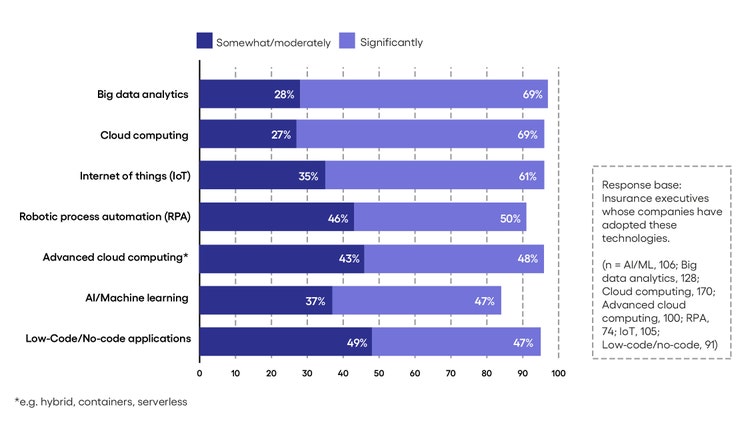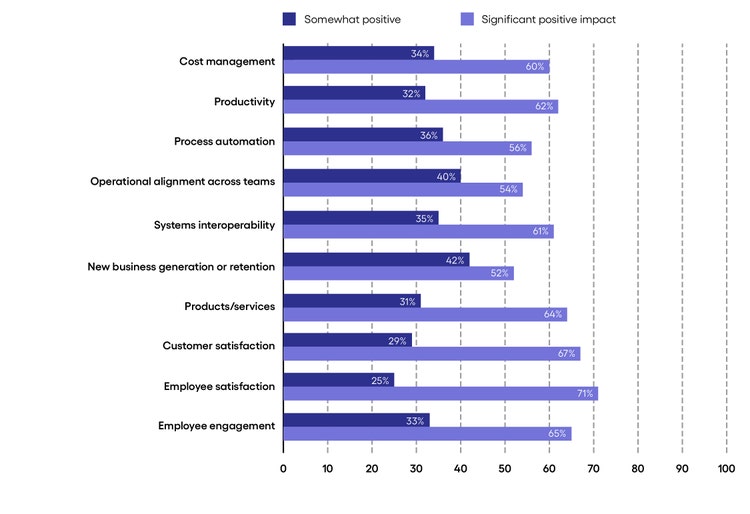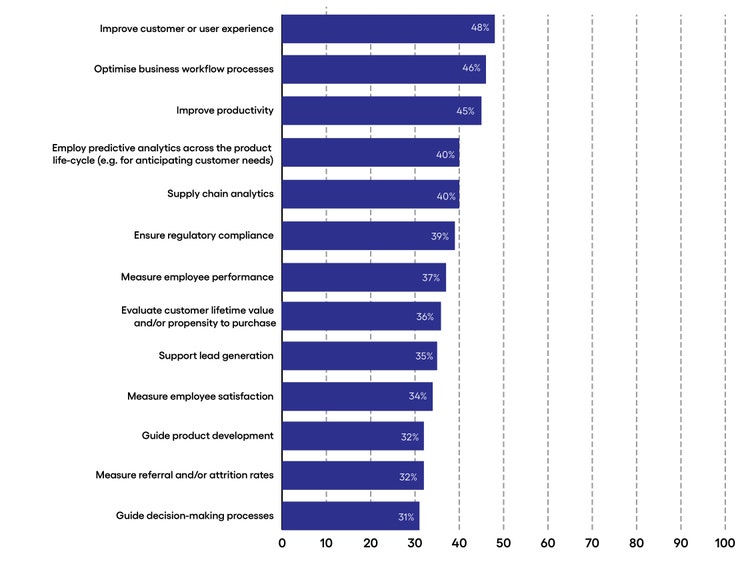
Insurers have a head start on the future — but the road ahead is uncertain styles-h2 text-white
data-xy-axis-lg:null; data-xy-axis-md:null; data-xy-axis-sm:70% 40%
<p><span class="medium"><br>July 29, 2022</span></p>
Insurers have a head start on the future — but the road ahead is uncertain
<p><b>While insurers are benefiting from admirable technology investment, they face both macroeconomic uncertainty and an evolving marketplace.</b></p>
<p>Few industries are as well positioned for the future as insurance. As Economist Impact research commissioned by Cognizant demonstrates, the industry, which was investing heavily in digital even before the pandemic, is full of companies that are recognizing strategic business value from their digital investments.</p> <p>Yet challenges remain. Insurers find themselves beset by niche insurtech competitors that are unencumbered by technical debt; a sometimes-challenging regulatory environment to innovate within; and ever more demanding consumers who insist on shopping, buying, and servicing experiences for complex products at a level akin to a purchase of a new set of earbuds.</p> <p>Here are insights on ways in which the insurance industry is future-ready—and where there is work to be done.</p> <h4>Sustaining the first-mover advantage</h4> <h5><span style="font-weight: normal;">What they’re good at</span></h5> <ul> <li><b>Mastery of data</b>. Insurance is all about data: how it informs the design of products and services, and how it manages customer experience. Insurers are ambitious users of technology and are skillful at linking it to business goals and extracting strategic value from it—this is fundamental to the business. Big data analytics and cloud technology are increasingly being used to handle the massive volumes of data passing through systems and risk engines, searching for insights that lead to differentiation. Almost seven in ten insurance companies that have adopted these two technologies are seeing them deliver significant value. Tech is moving beyond the foundational to the frontier, opening the doors to emerging risks and protection with the promise of predictive analytics and artificial intelligence (AI) contributing to healthier bottom lines and superior customer experience.</li> </ul> <h4>Insurers are deriving significant strategic value from tech investments</h4> <p><em>Respondents were asked to what extent the following technologies and methodologies already adopted by their business are delivering strategic value to their operations. (Percentage of respondents who advised each technology is, or is not, providing significant value to their business)</em><br> </p>

#
<p><span class="small"><br> Source: Economist Impact Survey 2022<br> Figure 1</span></p> <h5><span style="font-weight: normal;">Long way to go</span></h5> <ul> <li><b>Permissible use of data</b>. Insurers are pondering the digital dimension for applying techniques to improve the use of data, particularly in areas such as risk and rating. Regulation demands increased focus and is driving more and more tech investment (AI/machine learning, big data, etc.) to ensure customer privacy and data protection.</li> </ul> <h5><span style="font-weight: normal;">The importance of bridging the gap</span></h5> <ul> <li><b>Insurance products are changing rapidly as digitization accelerates. </b>From personal auto coverage in which driver behaviors are monitored from mobile phones to renewable energy technology that can be monitored online, the very nature of developing products for the market is evolving rapidly.<br> <br> </li> <li><b>Future regulatory considerations for data. </b>The emerging regulatory scenario will place significant pressure on compliance requirements facing insurers related to data security; consumer protection; and climate-change and environmental impacts.</li> </ul> <h4>From contented employees to connected customers</h4> <h5><span style="font-weight: normal;">What they’re good at</span></h5> <ul> <li><b>Employee satisfaction</b>. Insurers have largely embraced flexibility in areas such as hybrid work and are seeking to make themselves more attractive for tech-savvy and statistically trained talent in a highly competitive job market. Young talent today seeks not just financial rewards, but also purpose at work. Insurers exist precisely to give people security; given their exposure to environment-related risk, they also have a powerful incentive to embrace sustainability.</li> </ul> <h4>Tech adoption is benefiting multiple business areas</h4> <p><i>Respondents were asked what impact their company's technology improvement efforts had on the following business areas over the past year. (Percent of respondents who selected Somewhat positive, or Significant positive impact)</i><br> </p>

#
<p><span class="small">Response base: 250 senior insurance executives<br> Source: Economist Impact Survey 2022<br> Figure 2</span></p> <h5><span style="font-weight: normal;">Long way to go</span></h5> <ul> <li><b>New business generation and retention</b>. Just slightly above half of insurers believe tech adoption is significantly benefitting new business generation or retention. This falls well short of data’s potential. Since sales often run through the app or website of a digital retailer, a critical step to maximize this is for insurers to build out an API layer that smoothly integrates their systems with those of these retailers.</li> </ul> <h5><span style="font-weight: normal;">The importance of bridging the gap</span></h5> <ul> <li><b>Being embedded in tech ecosystems is critical to driving future value</b>. Insurers need to be well embedded in dynamic ecosystems through economical API solutions—for example, in partnership with innovative distribution startups.<br> <br> </li> <li><b>Commercial adjacencies and market opportunities emerge through ecosystems. </b>Post-sale relationships with clients can now become ongoing conversations that benefit all sides. For example, subject to customers’ consent, health insurers can use digital channels to nudge them to exercise more and eat healthier food—and then offer lower premiums to those with healthier habits.</li> </ul> <h4>From cognitive customer service to prescient product development</h4> <h5><span style="font-weight: normal;">What they’re good at</span></h5> <ul> <li><b>Customer experience</b>. Advances in technology, best practice adoption across industries, and an emphasis on journey-based engineering have been driving significant experience improvements in insurance. The movement to first understand the human-centric reality of business processes has opened transformational uses of conversational AI, natural language processing, and systems that interact with clients based on underlying emotions. For industry leaders, cognitive systems guide chatbots to respond to customers and escalate work to upskilled agents when tense situations need specialized, human-driven handling. The result is higher customer retention rates, lower agent turnover and the generation of insights to continuously improve customer experience.<br> <br> </li> <li><b>Workflow. </b>New workflows are being put in place so that the most predictable, rote and repetitive activities are handed off to software, while humans specialize in using judgment, creativity and language. Over time, intelligent process automation will improve and will continue to drive engagement specificity where the human touch is needed. </li> </ul> <h4>But insurers are not leveraging data optimally</h4> <p><i>Respondents were asked for which reasons their company is leveraging data. (Percent of respondents who selected each reason)</i><br> </p>

#
<p><span class="small">Response base: 250 senior insurance executives<br> Source: Economist Impact Survey 2022<br> Figure 3</span></p> <h5>Long way to go</h5> <ul> <li><b>Better decision-making processes</b>. The omnipresence of electronic devices and the prevalence of digital transactions mean data has never been more plentiful to insurers. Leaders have been making significant strides in leveraging it to stay engaged with customers and use behavioral insights for rating, passing stringent regulatory tests to deploy as part of innovative products. Most, however, still lack a comprehensive strategy to make use of abundant data; less than a third of insurers leverage data to guide decision-making processes.<br> <br> </li> <li><b>Product development. </b>The modern insurance company can develop and launch new products, from a technology perspective, in multiple markets in weeks, while laggards still require 12 or even 18 months to deploy new products.</li> </ul> <h5>The importance of bridging the gap</h5> <ul> <li><b>Risk is accelerating</b>. Insurers need to have the processes and technical capabilities, including filing/regulatory engagement to make use of available data to rate new risks. Emerging regulatory limitations on using traditional rating factors, such as rules to avoid data bias, are accelerating the need for these capabilities.<br> <br> </li> <li><b>The customer journey is changing fast</b>. Traditionally, insurance buyers used brokers to select and purchase policies. Then, there was the assumption that a direct-to-consumer relationship would prevail. In today’s world of abundant data and mature e-commerce, this model is giving way to a new ecosystem that requires insurers to do things differently. With the growth of ecosystems, the linear way of thinking is giving way to a continuum on which research and pricing may be started and completed online or may involve more traditional intermediaries along the way to advise on decisions.<br> <br> </li> <li><b>Costs must be reduced</b>. The modern insurance company begins with processes that assume zero-touch and builds exceptions with a hybrid of human and AI-powered support that can deliver a personalized policy.</li> </ul> <p>Economist Impact research commissioned by Cognizant demonstrates an insurance industry amidst evolutionary change. While insurers will continue to face myriad choices in deciding the next step toward the future, winners will keep experience and data as their North Star to inform the choices they make.</p> <p><i>To learn more, visit the <a href="/content/cognizant-dot-com/us/en/insights/modern-business.html" target="_blank" rel="noopener noreferrer">Modern Business</a> section of our website, or <a href="/content/cognizant-dot-com/us/en/about-cognizant/contact-us.html" target="_blank" rel="noopener noreferrer">contact us</a>.</i></p> <p><i>The views and opinions expressed in this report are those of Cognizant and do not necessarily reflect the view and policies of Economist Impact. Data presented is from an Economist Impact executive survey, commissioned by Cognizant, conducted in early 2022.</i></p> <p><i>This article was written by Tim Queen, Head of Consulting in Cognizant’s Insurance practice and Eduardo Plastino, Director in Cognizant Research.</i></p>
<p>We’re here to offer you practical and unique solutions to today’s most pressing technology challenges. Across industries and markets, get inspired today for success tomorrow.</p>
